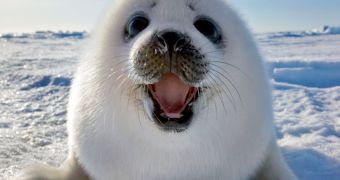Scientists writing in the journal PLOS ONE argue that, according to their investigations, ice loss in the North Atlantic must be held accountable for the fact that the US East Coast has recently experienced an increase in the number of seal strandings.
The researchers explain that, each year, harp seals gather on ice shelves floating close to Canada's east coast to breed and raise their offspring.
Once the weather begins to warm and the seal pups grow a tad stronger, the animals move north.
By the looks of it, increased temperatures recorded in these waters during the past few months have caused a decline in sea ice.
In turn, this has led to the harper seals' having less room available to mate and nurse their pups, Live Science explains.
The same source details that, once these patches of ice became overcrowded, numerous animals were forced into the water.
Some of the seals that had this fate were still too young and too inexperienced, hence the fact that they eventually stranded along the US East Coast.
Others were males, who are known to strand more often than females due to the fact that they don't think twice about venturing in dangerous waters.
The researchers maintain that their hypothesis explains why the majority of the seals rescued by conservationists in the US were cubs and males that were both dehydrated and starving.
Other studies have shown that the animals found stranded on beaches along the US eastern coastline were as genetically diverse as those living in the wild.
Therefore, the assumption that the strandings were caused by inbreeding does not hold.
“Genetics didn't seem to have an influence,” researcher Brianne Soulen explains.
Conservationists warn that, as global warming and climate change continue to progress, frozen regions at our planet's poles will shrink to a considerable extent.
This threatens the survival of animal species that cannot make do without ice and need it to hunt, breed and nurse their young.

 14 DAY TRIAL //
14 DAY TRIAL //